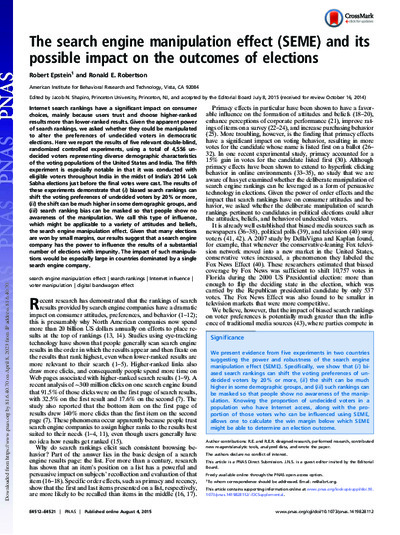The search engine manipulation effect (SEME) and its possible impact on the outcomes of electionsRobert Epstein, Ronald E. Robertson
Publikationsdatum:
|
 |
 Diese Seite wurde seit 2 Jahren inhaltlich nicht mehr aktualisiert.
Unter Umständen ist sie nicht mehr aktuell.
Diese Seite wurde seit 2 Jahren inhaltlich nicht mehr aktualisiert.
Unter Umständen ist sie nicht mehr aktuell.
 Zusammenfassungen
Zusammenfassungen
Internet search rankings have a significant impact on consumer choices, mainly because users trust and choose higher-ranked results more than lower-ranked results. Given the apparent power of search rankings, we asked whether they could be manipulated to alter the preferences of undecided voters in democratic elections. Here we report the results of five relevant double-blind, randomized controlled experiments, using a total of 4,556 undecided voters representing diverse demographic characteristics of the voting populations of the United States and India. The fifth experiment is especially notable in that it was conducted with eligible voters throughout India in the midst of India’s 2014 Lok Sabha elections just before the final votes were cast. The results of these experiments demonstrate that (i) biased search rankings can shift the voting preferences of undecided voters by 20% or more, (ii) the shift can be much higher in some demographic groups, and (iii) search ranking bias can be masked so that people show no awareness of the manipulation. We call this type of influence, which might be applicable to a variety of attitudes and beliefs, the search engine manipulation effect. Given that many elections are won by small margins, our results suggest that a search engine company has the power to influence the results of a substantial number of elections with impunity. The impact of such manipulations would be especially large in countries dominated by a single search engine company.
Von Robert Epstein, Ronald E. Robertson im Text The search engine manipulation effect (SEME) and its possible impact on the outcomes of elections (2015)  Dieser wissenschaftliche Zeitschriftenartikel erwähnt ...
Dieser wissenschaftliche Zeitschriftenartikel erwähnt ...
 Personen KB IB clear | B. J. Fogg | ||||||||||||||||||
 Begriffe KB IB clear |  Demokratie Demokratie democracy
, democracy
,  Internet Internet internet
, internet
,  Ranking
, Ranking
,  Suchmaschine Suchmaschine search engine search engine
| ||||||||||||||||||
 Bücher |
|
 Zitationsgraph
Zitationsgraph
 Zitationsgraph (Beta-Test mit vis.js)
Zitationsgraph (Beta-Test mit vis.js)
 Zeitleiste
Zeitleiste
 9 Erwähnungen
9 Erwähnungen 
- Weapons of Math Destruction - How Big Data Increases Inequality and Threatens Democracy (Cathy O’Neil) (2016)


- Digitale Öffentlichkeit - Wie algorithmische Prozesse den gesellschaftlichen Diskurs beeinflussen (Konrad Lischka, Christian Stöcker) (2017)


- Algorithms of Oppression - How Search Engines Reinforce Racism (Safiya Umoja Noble) (2018)

- (Un)berechenbar? - Algorithmen und Automatisierung in Staat und Gesellschaft (Resa Mohabbat Kar, Basanta Thapa, Peter Parycek) (2018)


- Hello World - How to Be Human in the Age of the Machine (Hannah Fry) (2018)

- Die Zukunft der Datenökonomie - Zwischen Geschäftsmodell, Kollektivgut und Verbraucherschutz (Carsten Ochs, Michael Friedewald, Thomas Hess, Jörn Lamla) (2019)


- 15. Jenseits der puren Datenökonomie - Social-Media-Plattformen besser designen (Thilo Hagendorff)


- 15. Jenseits der puren Datenökonomie - Social-Media-Plattformen besser designen (Thilo Hagendorff)
- Towards Digital Enlightenment - Essays on the Dark and Light Sides of the Digital Revolution (Dirk Helbing) (2020)

- Klick - Wie wir in einer digitalen Welt die Kontrolle behalten und die richtigen Entscheidungen treffen (Gerd Gigerenzer) (2021)

- Basis für tausend Suchmaschinen - Die EU will bis 2025 einen öffentlichen Web-Index aufbauen (Arne Grävemeyer) (2023)


 Anderswo finden
Anderswo finden
 Volltext dieses Dokuments
Volltext dieses Dokuments
 |  The search engine manipulation effect (SEME) and its possible impact on the outcomes of elections: Artikel als Volltext ( The search engine manipulation effect (SEME) and its possible impact on the outcomes of elections: Artikel als Volltext ( : :  , 784 kByte; , 784 kByte;  : :  ) ) |
 Anderswo suchen
Anderswo suchen 
 Beat und dieser wissenschaftliche Zeitschriftenartikel
Beat und dieser wissenschaftliche Zeitschriftenartikel
Beat hat Dieser wissenschaftliche Zeitschriftenartikel während seiner Zeit am Institut für Medien und Schule (IMS) ins Biblionetz aufgenommen. Er hat Dieser wissenschaftliche Zeitschriftenartikel einmalig erfasst und bisher nicht mehr bearbeitet. Beat besitzt kein physisches, aber ein digitales Exemplar. Eine digitale Version ist auf dem Internet verfügbar (s.o.). Aufgrund der wenigen Einträge im Biblionetz scheint er es nicht wirklich gelesen zu haben. Es gibt bisher auch nur wenige Objekte im Biblionetz, die dieses Werk zitieren.









 Biblionetz-History
Biblionetz-History